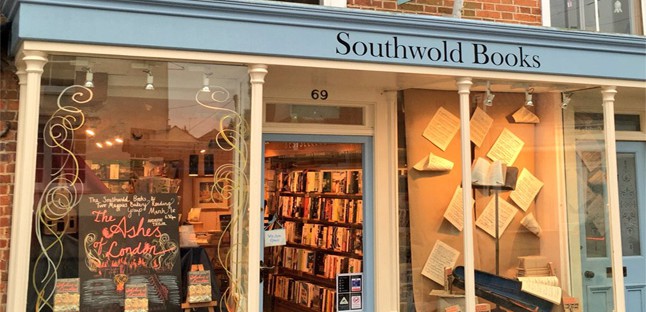Latest posts
A masterclass in creating value
What’s going on at parkrun?
Virtue-signalling all the way to the bank
Bud Light: brand purpose or virtue-signalling?
The Coddling of the American Mind, by Greg Lukianoff and Jonathan Haidt
Belonging, by Owen Eastwood
Such a simple thing
The Long Win, and The Scout Mindset
The Cult of We by Eliot Brown and Maureen Farrell
Coffee and covid modelling
By theme
Marketing strategy
Insight & metrics
Innovation & inspiration
Brand & positioning
Marketing communications
Business purpose
Leadership
By industry sector
Financial services
Retail
FMCG
Technology & start-ups
Consumer services
Business to business
Other sectors
By type
Books
Comment
Quotes
Thought leadership
The latest #fakenews is that Waterstones have opened “unbranded bookshops”. Despite what many trustworthy sources are reporting, Waterstones, the last remaining chain of specialist bookshops on the high street, have done nothing of the sort. The real story is that a national retail chain is creating hyper-local brands, one-off retail outlets seemingly tailored to their location. If they deliver on what those brands promise, they’ll be doing us all a favour.
Southwold Books in Suffolk, Harpenden Books in Hertfordshire and The Rye Bookshop in East Sussex have simple fascias that make them look like independents. They have a small handwritten sign in the window saying their name is a trading name of Waterstones. Discreet, yes, but in keeping with the style of the store.
The outcry over this move is because it looks disingenuous. Are Waterstones passing off these stores as independent, with all the virtue now associated with that? For although we love the low prices of Amazon and Tesco, we also love to defend the little guy. Independent booksellers have had it very hard in recent years, not just from Amazon, but also from supermarkets selling the high volume blockbusters. For all the professed love for the independent retailer and the individual high street, more people buy books from the big guys more of the time. Remember Borders? That was a specialist book retailer with scale but they still didn’t make it.
Waterstones nearly went under for the same reasons. So now they’re trying to be different. With Southwold Books et al, we’re seeing the adoption in retail of a strategy well-known to the food and drink industry. For years now, big branded businesses across many sectors including soft drinks, beer and spirits, snacks and biscuits, have done this. They seek both to acquire genuine small brands and to create what look like artisanal brands. Sometimes there’s no visible connection, though when Walkers launched the Market Deli range, to compete with premium-priced sharing snacks like Kettle Chips, they found that the quality assurance of the market leader outweighed the virtue signalled by independence. So the packs clearly say “from the makers of Walkers”.
Like Walkers, Waterstones seem to want to play both ends of the market, with the big brand stores and the quirky one-offs. But it’s more than that. Under MD James Daunt who came from the successful independent Daunt Books, they’re trying to adopt some of that independent spirit in every store. Their website claims that “no two Waterstones bookshops are the same, with each shop tailoring its range to reflect the trends and interests of their local market.”
This is novel. The whole point of a brand is to make the experience predictable and consistent – always matching our expectations, so always the same. Daunt says his biggest challenge is to convince his own staff that they have autonomy, in part because under their previous owners HMV and WH Smith they didn’t. Persuading customers won’t be easy either, though the signs are already there instore, with favourites picked by store staff, displays of local authors, and the like.
As for these three little stores, it’s encouraging that a big retailer is willing to open tiny stores in these small towns. Until recently, Rye, Harpenden and Southwold had no book shop (according to Daunt). Search for those places now on the Waterstones shop finder and up they pop – no pretence that they are not part of the group. There is speculation that this “independent” route may be the future for Waterstones. It would be a failure of their mighty brand heritage if they really felt that one-offs had more consumer appeal. There’s a really compelling proposition in here – individuality and local customisation, backed by the buying power of a national chain. That applies as much to Waterstones in Kingston as to The Rye Bookshop. If Waterstones learn how to deliver that in every store, they will have a bright future.
Latest posts
A masterclass in creating value
What’s going on at parkrun?
Virtue-signalling all the way to the bank
Bud Light: brand purpose or virtue-signalling?
The Coddling of the American Mind, by Greg Lukianoff and Jonathan Haidt
Belonging, by Owen Eastwood
Such a simple thing
The Long Win, and The Scout Mindset
The Cult of We by Eliot Brown and Maureen Farrell
Coffee and covid modelling
By theme
Marketing strategy
Insight & metrics
Innovation & inspiration
Brand & positioning
Marketing communications
Business purpose
Leadership
By industry sector
Financial services
Retail
FMCG
Technology & start-ups
Consumer services
Business to business
Other sectors
By type
Books
Comment
Quotes
Thought leadership
